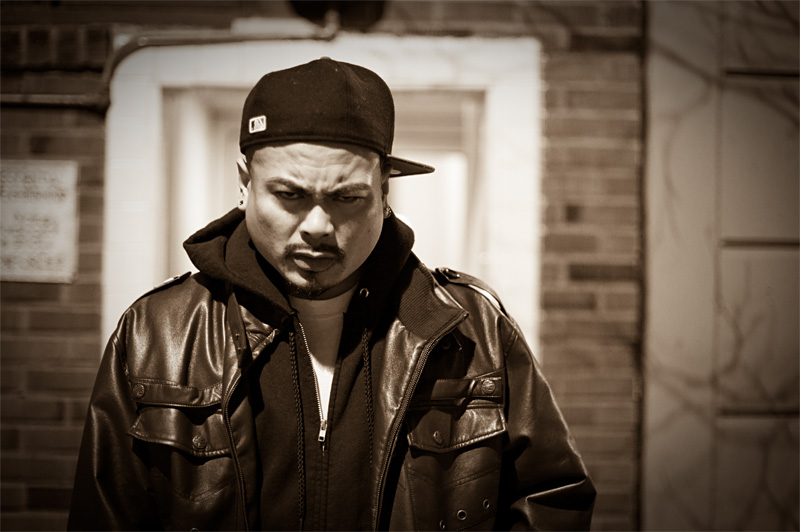“I’m kind of waiting for the system to die,” says 21-year-old Seattle rapper Scribes of his makeshift recording equipment. He’s seated in front of an ancient-looking Dell PC in his Capitol Hill apartment, showing off the first steps in his process before taking his material to a professional studio. First he rhymes into a rickety microphone, records all his tracks with Pro Tools, and uses a bootleg of another program called ACID to chart the song’s different layers, from vocals to sound effects.
But Seattle native Henry “Scribes” Kleaveland’s pessimism extends beyond his “system.” Since dropping his politically-minded debut disc, Sleepwalk, not long after graduating from Nathan Hale High School in 2006, he’s experienced a maddening combination of good and bad luck. Although he secured financing for his second album from Pearl Jam guitarist Mike McCready, all the money and hard work literally vanished when the album—the digital masters and various pieces of recording equipment—was stolen in November from Forevergreen Studios. As a result, one suspects the quality of his system is the least of his worries.
“I got to be kinda quiet,” he says, pointing up to indicate his neighbors, before playing an early version of the song “Do You Hear Me Now” off his new EP, Summertime Sampler 2009. He’s releasing the disc May 16 in connection with a show at the Vera Project that night. The track he’s playing was recorded by Seattle producer Captain Midnite, with backup vocals by Camila, and is a mournful breakdown of the difficulties of maintaining his integrity while trying to break into the recording industry.
The lyrics have an acidic flavor that hints at Scribes’ hard-won lessons. But it’s not until the song’s end, as the drums lazily pound in the background, that Scribes’ philosophy becomes most apparent. Speaking directly to listeners (and doubtlessly to himself), he declares: “When it comes down to it, it’s about me and those people who support me.”
The role struggle plays in the life of artists, no matter the medium, is of course an old story. Scribes walks down this rutted trail with impressive grace on the EP’s five tracks, except for the Bush-bashing “The Bush Is Over”; the Sebino-produced cut feels like a holdover from the fiercely, if somewhat naively, political debut he recorded at local rapper Macklemore’s home studio.
He opens strong with the only other track produced by Captain Midnite, “Forgive Me.” It deals with the moral sacrifices people make for financial success. It’s here that his lyrical wit shines through with clarity as he ponders: “I’m asking what’s your role, homie, you a rebel with C.R.E.A.M?/Or are you just a piece of metal in the devil machine?” Scribes sings this chorus, as well as the entirety of the Nick Rapp–produced “Outro,” with an effectiveness that brings hip-hop crooners like André 3000 and Mos Def to mind. And it’s to his advantage here that his voice, whether singing or rapping, vibrates with a haunting quality that mirrors the EP’s raw-wounds theme.
When one considers that after his full-length was stolen, Scribes had to completely re-record these songs from scratch at Isaac Meek’s Undercaste studio, the quality of the work becomes even more impressive. “I would be further along, sure,” says Scribes, a coy smile cracking across his boyish face, when asked how the theft impeded his progression. After all, he was to release his original disc, Thruourmusic, produced by BeanOne, at a February show on his 21st birthday. Sadly, Scribes couldn’t afford to hire BeanOne again for the EP, but, he adds, echoing advice that McCready gave him after hearing the bad news, “I’m almost glad it got stolen. It forced me to be kinda resourceful.”
McCready says it’s his firsthand knowledge of young musicians’ hard-knock lives, coupled with the good impression Scribes made on him both as a person and an artist, that led the veteran rocker to finance the album after they met at the gym where Scribes works. While the loss of the album was a definite tragedy, McCready, whose financial stake in it was more as a benefactor than an investor, maintains that such difficulties are a necessary evil.
“Within the struggle, you become a better musician and a better human being—if you don’t let the people who are saying ‘no’ to you get you down,” says McCready.
To his credit, Scribes knows what he’s up against—and how to combat it: “The longer and longer that you don’t put music out, you become less relevant,” he says. “It’s just a matter of getting better.”







